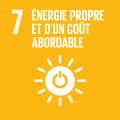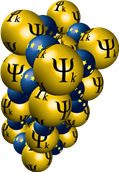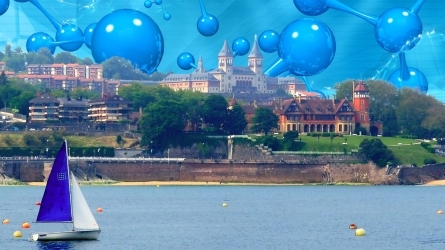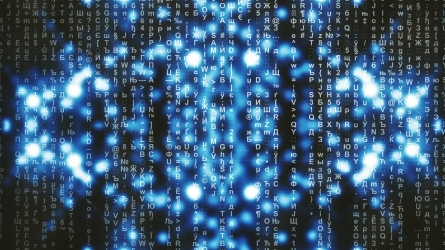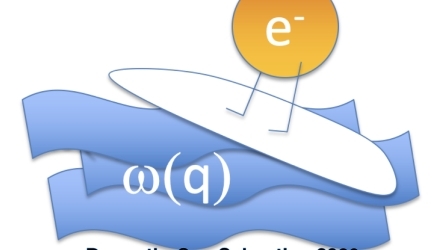
LIVE ONLINE CONGRESS - International conference on electron-phonon coupling and thermoelectric efficiency
Azalpena
Motivation:
Among the grand technological challenges that our society is collectively facing, energy production and storage is acquiring—by the day—an ever prominent role. A related challenge is the efficient use of energy for intensive computing and data management, which goes hand in hand with the miniaturization to the molecular scale and the quest for new paradigms, such as quantum computing.
Any improvement in the fundamental physical understanding of the transport phenomena behind these grand challenges will lead to giant leaps towards a more sustainable and productive society. Whether we want to mitigate the environmental impact of fossil fuel exploitation or to devise more comprehensive solutions to energy management, a deeper understanding of both charge and thermal transport is utterly necessary. Typical examples in which electronic and lattice thermal transport go hand in hand are Joule heating and the thermoelectric effect: the former is the main show-stopper for efficient microelectronics, whereas the latter offers a viable, yet still inefficient, way to recycle waste heat or to achieve active cooling. While for a long time, electronic transport and lattice thermal transport have been treated separately, relying on the adiabatic approximation and effective semiclassical approaches, the accurate treatment of electron-phonon coupling by first principles is an essential ingredient to include to attain predictive modeling of electronic transport, Joule heating, and thermoelectric energy conversion. The interest in electron-phonon coupling has thus rapidly increased in the past ~5 years, boosted by the availability of more powerful computational resources and, most importantly, by the development of both more efficient computational approaches and new powerful experimental techniques.
Advancements in improving thermoelectric efficiency are slow and often dictated by the serendipity rooted in the delicate balance upon which efficiency stands. Indeed, the latter combines both electrical and thermal transport (ideally, large the first and small the second) that are correlated in most materials and devices. While significant progress has been achieved using nanostructured materials, further understanding of the coupling and decoupling between charge and thermal transport would open new pathways for thermoelectric energy conversion. The fundamental physical phenomena that need to be addressed are strictly related to electron-phonon coupling in complex materials, in low-dimensional nanostructures and molecular devices. Both computational modeling tools and experimental approaches to directly probe electron-phonon coupling are still at an early proof-of-principles stage, with plenty of room for new developments and exciting applications that will shed light onto essential frontier phenomena in complex systems.
In this conference, we aim to bring together the international community working on electron-phonon interaction, with a strong drive toward application in nano-electronics, molecular electronics, and thermoelectric energy conversion, to discuss and share the progress achieved in recent time. The conference scope is to establish a stable link between the theory and the experimental communities since any progress made by the former has a substantial impact on the ability of the other of producing effective devices. The conference will feature invited talks from the most prominent protagonists in the field, contributed talks, and round table discussions, aiming at establishing a roadmap to bring together theory and experiments.
Practical aims and objectives:
The community interested in electron-phonon coupling is vast as it is easily recognised by the variety of topics in which this effect could potentially enter, ranging from thermoelectric energy conversion, electronic cooling, superconductivity, but also inelastic scattering experiments. At the heart of predicting the effect of electron-phonon coupling on the performance of a particular structure, lies our ability of modeling and characterize the relevant factors both with ab initio methods and with phenomenological models, justified through comparison with experience. Conferences and workshops are usually the place where the bridging between what is possible within theory explores the experimental possibilities and the discussion that usually ensues brings about new calculations or experiments. Bringing together a representative set of the leading scientists in the field of electron-phonon coupling and thermoelectric generation and dissipation, we plan to boost discussion and potentially open up new research lines to make the discovery of new technological solutions possible.
The conference scope is to establish a stable link between the theory and the experimental communities since, on the one hand, any progress made by the former has a substantial impact on the ability of the other of producing effective devices, and, on the other hand, advances in fabrication and in measurement techniques call for new modeling efforts. This cross-disciplinary interaction among physicists, chemists and engineers, either theoretically or experimentally oriented, will be accelerated and stimulated by the format of the conference, which will emphasize “dialog” alongside with traditional display of scientific results. The conference will feature invited talks from the most prominent protagonists in the field, contributed talks, and panel discussions aiming at establishing a roadmap to bring together theory and experiments. The program will also leave ample time for informal discussions, for example during the poster session, coffee breaks, and social activities. The following detailed objectives will be pursued:
- We plan to bring together about 15 invited speakers and 50 attendees, both at senior and junior level, working on transport phenomena, electron-phonon coupling and thermoelectric energy conversion;
- We aim at fostering a large number of potential collaborations, allowing theorists and experimentalists to interact and discuss;
- We plan to present both practical problems and solutions: all the invited speakers are asked to focus on a set of questions or solutions to outstanding problems in the community;
- The community has time to discuss the issues related to efficient energy conversion and the actual limits of the available technologies. The program includes oral and poster presentations, panel discussions and informal occasions for further interactions, so to foster active dialog among the participants;
Meeting Programme
A tentative programme schedule is attached. We plan to have topical sessions on specific aspects of the electron-phonon interactions and their potential effects on transport phenomena and energy conversion, so as to unravel the main progress in methods development and breakthrough results from both theory and experiments. Each invited speaker is allocated 45 minutes for presentation, of which at least 10 should be left for questions and discussion. Each of the contributed talks has 30 minutes of which at least 8 should be left for discussion. A poster session will be held on the evening of the first day after the last contributed talk. Furthermore we will organize two one-hour panel discussions with four experts of different aspects of electron and phonon transport and electron-phonon coupling (2 theorists + 2 experimentalists), moderated by one of the organizers, so to highlight points of contact and synergistic strategies for future developments in the field. The moderator will pose the first set of provocative questions and eventually the discussion will actively involve all the attendees. The actual programme will be defined whence we have received full confirmation of all the invited speakers.
Tentative list of speakers
Confirmed speakers:
Andres Cantarero (University of Valencia, Spain)
Sebastian Reparaz (CSIC - Barcelona, Spain)
Maria Soledad Martin Gonzales (CSCI - Madrid, Spain)
Dmitry Turchinovich (Univ. Bielefeld, Germany)
Feliciano Giustino (University of Texas - Austin, USA)
Marco Bernardi (Caltech, USA)
Roxana Margine (Binghamton University, USA)
Francesco Mauri (University of Rome La Sapienza, Italy)
Mads Brandbyge (DTU Lyngby, Denmark)
Gemma Salomon (University of Copenhagen, Denmark)
Fabian Pauly (OIST, Japan)
Marco Buongiorno-Nardelli (University Northern Texas, USA)
Ion Errea (Universidad del Pais Vasco, Spain)
Ivana Savic (Tyndall Cork, Ireland)
To be confirmed:
Clivia Sotomayor Torres (ICN2 Barcelona, Spain)
Paz Vaquiero (University of Reading, UK)
Keith Nelson (MIT, USA)
Nicola Marzari (EPFL, Switzerland)
Organising Committee
Roberto D'Agosta (UPV/EHU and IKERBASQUE)
Davide Donadio (University of California - Davis)
Thomas Frederiksen (DIPC and IKERBASQUE)
Helburuak
Bring together the communities working on thermoelectricity and electron-phonon coupling to establish fruitful connection between them.
Foster collaborations between the experimental and theory groups on these outstanding problems.
Bring once again San Sebastián and the Basque Country at the forefront of an important scientific and technological problem thus fostering the internationalisation of our research activities.
Provide the young members of the audience, both PhD student and postdocs, a good reference for their investigation and shaping of their research activities on this field by bringing together some of the most prominent scientists.
Jarduera nori zuzenduta
- Unibertsitateko ikaslea
- Profesionalak
Kolaboratzaileak
Zuzendariak
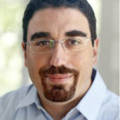
Roberto D'Agosta
UPV/EHU
Roberto D'Agosta is a Ikerbasque Research Professor in the Department of Materials Science of the University of the Basque Country in San Sebastian. A PhD in Physics from the University of Rome "Tre" and the degree in Physics from the University of Rome "La Sapienza", Roberto has spent 2 years at the University of Missouri - Columbia and 3 years at the University of California - San Diego before joining Ikerbasque. His research interest have spanned from cold atoms physics, to strong correlation to thermoelectric materials.
Matrikula prezioak
| MATRIKULA | 2020-11-13 arte |
|---|---|
| 5,00 EUR | |
| 0 EUR |
Kokalekua
Online zuzenean
Online zuzenean
Sustainable development goals
2030 Agenda da nazioarteko garapenerako agenda berria. Nazio Batuen Erakundeak onartu zuen 2015eko irailean eta giza garapen jasangarriaren aldeko tresna eraginkorra izan nahi du planeta osoan. Haren zutabe nagusiak dira pobrezia errotik desagerraraztea, zaurgarritasunak eta desberdintasunak urritzea, eta jasangarritasuna bultzatzea. Aukera paregabea eskaintzen du mundua 2030. urtea baino lehen aldatzeko eta pertsona guztien giza eskubideak bermatzeko.

7 - Energia irisgarria eta ez kutsagarria
Pertsona guztiek energia eskuragarria, fidagarria, jasangarria eta modernoa izango dutela bermatzea. Gai gakoak: eskuragarritasun unibertsala, energia garbien proportzioa handitzea, energia eraginkortasuna, ikerketa, energia azpiegituretan eta teknologia garbietan inbertsioa sustatzea, energia zerbitzu moderno eta jasangarriak.
Informazio gehiago